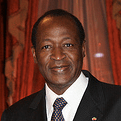Since February, Burkina Faso has been shaken by major protests led by students, merchants and members of the country's security forces. President Blaise Compaoré has responded with a combination of government reshuffles, outreach to aggrieved factions and repression. Yet unrest has increased, with a large crowd gathering in the capital Ouagadougou on Saturday to demand Compaoré's departure.
The protests reflect both economic and political frustration. Burkina Faso, a landlocked nation whose economy relies on cotton and gold exports, is one of the poorest countries in West Africa, with an average life expectancy of less than 54 years and a per capita GDP of $1,200. Many Burkinabé were suffering even before costs of living began rising in 2008, and the post-electoral crisis in their economically powerful neighbor, Cote d'Ivoire, has sent prices soaring higher still.
Politically, the relative democratization that swept through much of West Africa in the 1990s and 2000s bypassed Burkina Faso. Compaoré came to power in 1987 through a military coup against his predecessor, the leftist revolutionary Capt. Thomas Sankara. He then won elections in 1991, 1998, 2005 and 2010, taking more than 80 percent of the official vote each time, sometimes amid opposition boycotts and allegations of rigging. Over the course of his rule, he has consistently sought to skirt or remove constitutional term limits. It was not surprising, then, that voters were reportedly apathetic in last year's elections.

